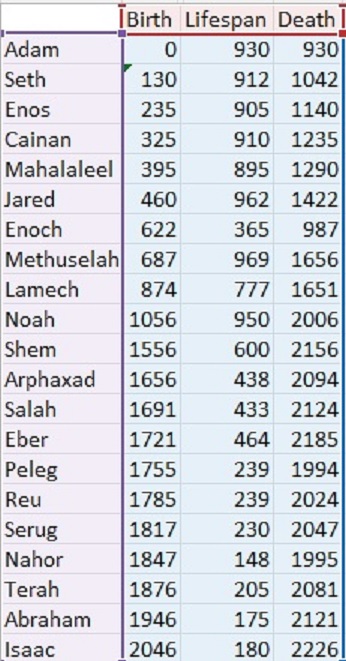The Curious Ages of the Ancient World
2022-09-23
Consider the ages of the patriarchs from creation until Isaac. This causes a lot of questions, and we do not have a lot of answers. The Birth and Death columns are in years since creation. (Disclaimer: I did my best in calculating these numbers, but I could be wrong. They match data I have seen from others.)

First, we see that people lived extremely long lives. The oldest living person on record was Methuselah at 969 years (Genesis 5:27), who died the year of the flood. The Flood would have been 1656 years after creation, give or take a few years. We know this because “Noah was six hundred years old when the flood of waters was upon the earth” (Genesis 7:6). I say 1656 give or take a few years, because there are no mention of months and days with the men’s ages, and it would be unlikely that they all died on their birthdays. We cannot know if Methuselah died of old age or if the floodwaters took him away. He outlived his son, Lamech.
People lived a lot less long immediately after the flood. Noah lived to be 950 years old, but his grandson only lived 438 years. After the Babel diaspora, which we know to be in Peleg’s lifetime (Genesis 10:25), we see the ages drop even more. These judgments for sin affected the lifespan of humankind. Salah outlived Abraham, his great-x6-grandson, by three years.
One could argue that these genealogies are not complete. But they must be in these cases because ages are given of when they were born and died. There is no room for gaps, for example:
And Seth lived an hundred and five years, and begat Enos: And Seth lived after he begat Enos eight hundred and seven years, and begat sons and daughters: And all the days of Seth were nine hundred and twelve years: and he died. (Genesis 5:6-8)
One might argue the case of Cainan the son of Arphaxad, listed in Luke 3:36, but if we are to take the ages in Genesis at face value, then Cainan was not a biological son, but rather the result of a levirate marriage, an adoption, or some such thing.
Enoch did not die, but was taken by God directly to heaven, which explains his short lifespan. We do not know why Lamech died earlier than his father. Such things happen.
Why put these numbers in here? The Flood clearly altered the lifespan of humankind. But it also leaves us wondering, what else could have changed since the Flood? One must wonder if this altered the half-life of Carbon 14, the speed of light, and who knows what else. The world before Flood and Babel was drastically different from what we know about our modern world. We cannot take what we know about life and the world now and thrust those principles on how the world was then. Short of a real-life H.G. Wells time machine, we cannot know.
Also, with large, overlapping lifespans, we can see how Genesis would have been transmitted. Adam could have known Lamech, the father of Noah. Abraham may have known Shem, Noah’s son, or even Noah. Abraham could have told his great-grandfather that he did not believe him about the Flood or the Creation of God, but he could go back to an ancient patriarch and confirm the details himself. This shows us how the ancient records of Genesis have been preserved through endless centuries by God’s sovereignty.
